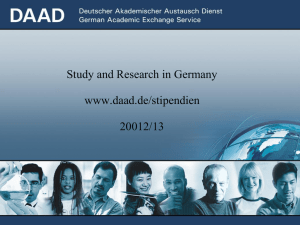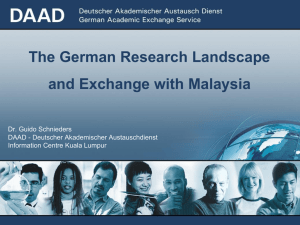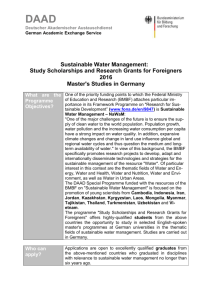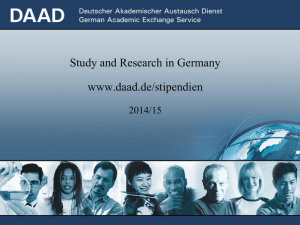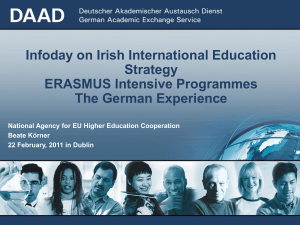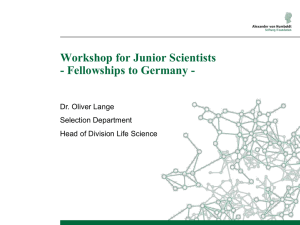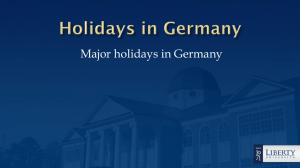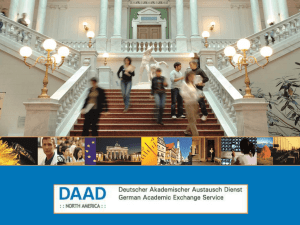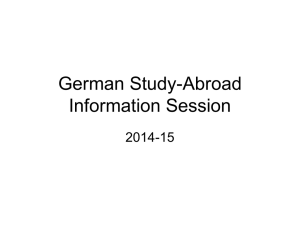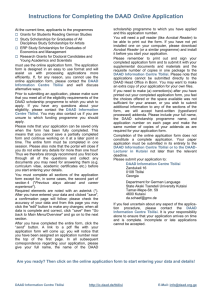Study and research in Germany - Universiti Teknologi Malaysia
advertisement
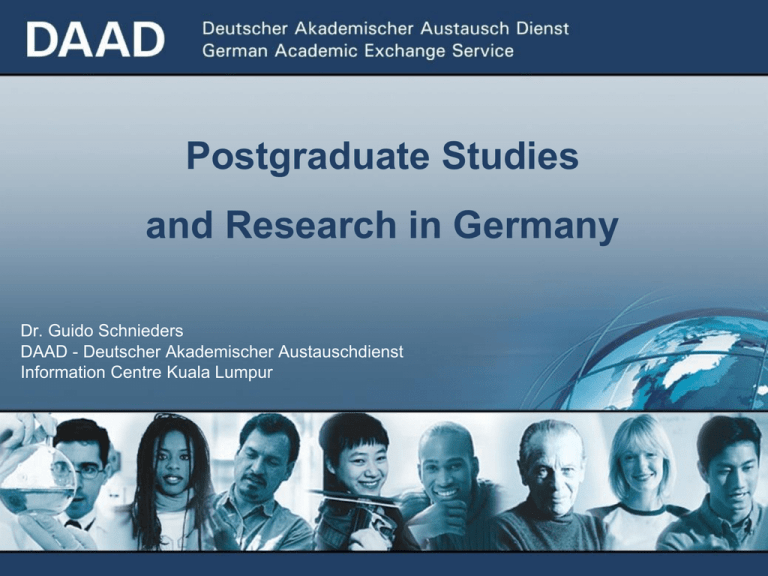
Postgraduate Studies and Research in Germany Dr. Guido Schnieders DAAD - Deutscher Akademischer Austauschdienst Information Centre Kuala Lumpur DAAD is ... Deutscher German Akademischer Academic Austausch Exchange Dienst Service ...a self-governing organisation of German universities 236 Member universities 124 Student bodies 07/2008 2 DAAD is your partner. Worldwide. • We promote academic co-operation between Germany and the world To achieve this, we • provide scholarships; • help establish university co-operations; • offer free information and counseling on study and research opportunities in Germany; • promote German language and German studies in Malaysia. 07/2008 3 DAAD budget 2013 by sources European Union 57.7m Euro = 14% Ministry for Economic Cooperation and Development 39.9m Euro = 9% Other funds 40.7m Euros = 10% Foreign Office 181m Euros = 43% 419.9 Mio Euro 1.65 bn Ringgit Ministry of Education and Research 100.6m Euro = 24% 07/2008 4 Germany – closer to you than you may think! Automobile, Karl Benz and Gottlieb Daimler, 1885 Diesel Engine, 1898, Rudolf Diesel Toothpaste, Ottomar Heinsius, 1907 MP3 Format, Fraunhofer Institute, 1987 Electronic computer, Konrad Zuse, 1941 Television, Manfred von Ardenne, 1930 07/2008 5 Germany – a Gateway to Europe Germany lies in the heart of Europe and has nine direct neighbours. With many of them, Germany forms an area of free circulation (no border controls, no visa) which makes it easy to travel within Europe 07/2008 6 Some facts about Germany Largest member of the EU A popular tourist destination 4th largest economy in the world World’s export champion for five consecutive years (until 2009) Malaysia’s most important trading partner in Europe Muslim population of about 4 Mio. (= almost 5%) 07/2008 7 German Education: Producing Innovation and Economic Success • Mercedes-Benz, BMW, Audi, Volkswagen (Lamborghini, Bugatti, Bentley...) • Sportswear from Puma and Adidas • Pharmaceuticals from Bayer • Siemens, Infineon, Bosch, SAP... • Currently some 400 German companies in Malaysia Products “Made in Germany” are well known for their high quality 07/2008 8 German research – a track record of success More than 100 Nobel prize winners. In recent years: 2013 Medicine (Thomas Südhoff) 2009 Literature (Herta Müller) 2008 Medicine (Harald zur Hausen) 2007 Chemistry (Gerhard Ertl) 2007 Physics (Peter Gruenberg) 2005 Physics (Theodor Haensch) 2001 Physics (Wolfgang Ketterle) 2000 Physics (Herbert Kroemer) 07/2008 9 Where do International Students go? 3,7 Million international students world wide ca. 13% of all students in Germany are international (more than 300.000) Sourse: OECD Education at a Glance 2011 07/2008 10 Malaysian students in Germany (HE degree programmes) Number of students 1000 800 600 400 200 2011 2010 2009 2008 2007 2006 2005 2004 2003 2002 2001 2000 1999 1998 1997 1996 0 07/2008 Quelle: Wissenschaft Weltoffen 11 Degree programmes Bachelor Master Doctoral degrees (exception: medicine, pharmacy, law) Database with list of all courses: www.study-in.de 07/2008 12 University tradition Humboldt’s vision of education: “Unity and freedom of research and instruction” Tradition of enlightenment „Academic freedom“ >> Self-dependent, self-responsible personality as educational goal 07/2008 13 Wide range of study opportunities 350 Universities (state funded) • 117 Research & Technical Universities • 187 Universities of Applied Sciences • 47 Colleges of Art and Music • Private universities and colleges (only 4,5% of students) 07/2008 14 University of Applied Sciences University/Technical University ø Student number: 4.000 ø Student number: 15.000 • close cooperation with industry • theoretical/academic orientation • Practise-oriented education and integrated internships • duration: 3-4 + 1-2 years • duration: 3 + 2 + 3-4 years • application-oriented thesis • research-based thesis • subjects: engineering, business, social sciences, design • wide range of subjects • degrees: Bachelor, Master • degrees: Bachelor, Master, PhDs • ca. 800.000 students • ca. 1,64 million students 07/2008 15 The German Research Landscape The German Research System is characterised by three different players: - state-funded institutions (ca. 750) Research of higher education institutions (universities, universities of applied sciences etc.) - Non-university based research facilities (Max Planck Society, Helmholtz Association, Fraunhofer Gesellschaft, Leibniz Association etc.) - privately financed institutions Industrial research by companies (Siemens, Bayer, BASF, AiF etc.) 07/2008 16 Research expenditures in Germany Totel expenditures 2011: 267 bm RM Max Planck Society Universities Helmholtz Association Fraunhofer -Gesellschaft Leibniz Association other public or private research institutes 16,2 % 14,0 % 69,8 % Industry Figures for 2007, Source: Statistisches Bundesamt 07/2008 17 Financial Aspects World-class education at competitive costs! no (or very moderate) tuition fees generally no tuition fees at PhD level Living cost: around Euro 8.000 per year (RM 36.000 per year) 07/2008 18 International programmes Over 1.000 degree programmes taught in English (mainly Master’s courses) www.daad.de/international-programmes 07/2008 19 Admission Requirements Master • BA from an internationally recognised university • proof of relevant language proficiency • specific requirements by the individual university Check the website of the course of your choice! 07/2008 20 Learning German – an asset! • 16.000 degree programmes - the majority taught in German • Knowlegde of German will open up a wealth of social and professional opportunities for you: • 400 German companies in Malaysia • After graduating from Germany, you are entitled to work there 07/2008 21 Working in Germany Studying is a full-time occupation, but students may find a part-time job on or off-campus in order to gain practical experience and to improve their financial situation. Up to 120 full days or 240 half days per year are allowed! After graduating from a German university, you may stay on for another 1,5 years to search qualified employment. Those successful in their search can have their residence permit extended. 07/2008 22 Options for PhD Studies Traditional guidance model Individual mentoring by thesis supervisor International Postgraduate Programmes (IPP) Structured 3-4 year programmes Supervisor will be provided English as language of instruction Check out the courses available at: www.daad.de/international-programmes 07/2008 23 Further options for PhD studies – Graduate Schools International Research Training Groups (DFG funded) Subject-oriented and temporary institutions in the fields of humanities, natural sciences and engineering – www.dfg.de International Max Planck Research Schools 29 centres of scientific excellence in the fields of computer science, natural sciences etc. Graduate Schools of the Federal States of Germany Ph.D. programmes in various disciplines, often in the English language 07/2008 24 Admission Requirements PhD • MA from an internationally recognised university • Proof of relevant language proficiency • specific requirements by structured PhD-programme OR • acceptance by a supervisor in case of individual PhD 07/2008 25 DAAD Funding Opportunities: Scholarships for individuals Research Grants for PhD candidates Research Grants for PhD candidates within the “Sandwich Model” Postgraduate Courses for Professionals Research Stays for Scientists Re-Invitations for DAAD-Alumni Study Visits for Groups of Students Check out: www.funding-guide.de 07/2008 26 DAAD PhD Scholarships www.funding-guide.de research projects at a German university for the purpose of gaining a doctorate in Germany (3 years research, PhD awarded by the German university) requirements: Master‘s degree, good Bachelor‘s degree no more than 6 years between Master‘s degree and start of PhD studies admission to a structured PhD-programme or confirmation of supervision by a German professor Application deadline: 15 October 07/2008 27 DAAD Sandwich Scholarship www.funding-guide.de support for a „Sandwich“ structure of studies combining periods of study / research in Germany with those in the home country (between 12 and 24 months research in Germany, PhD awarded by Malaysian university) requirements: Master‘s degree, good Bachelor‘s degree no more than 3 years between start of PhD studies and commencement of scholarship enrolled as a PhD-student in University in Malaysia Application deadline: 15 October 07/2008 28 How to find the right university / the right course? All information you need is available in the internet! General Information www.daad.de ic.daad.de/kualalumpur www.study-in.de University Ranking www.daad.de/deutschland/studienangebote/ranking/en/ 07/2008 29 DAAD Information Centre Kuala Lumpur Address German Business Center, Suite 47.05 Menara AmBank, No. 8 Jalan Yap Kwan Seng 50450 Kuala Lumpur Contact Tel/Fax: 03-92351841 E-mail: info@daadkl.org Web: http://ic.daad.de/kualalumpur facebook: DAAD Information Center Kuala Lumpur Consultation hours please register for our information sessions or make an appointment Subscribe to our Email Newsletter! Just send us a mail! 07/2008 30
